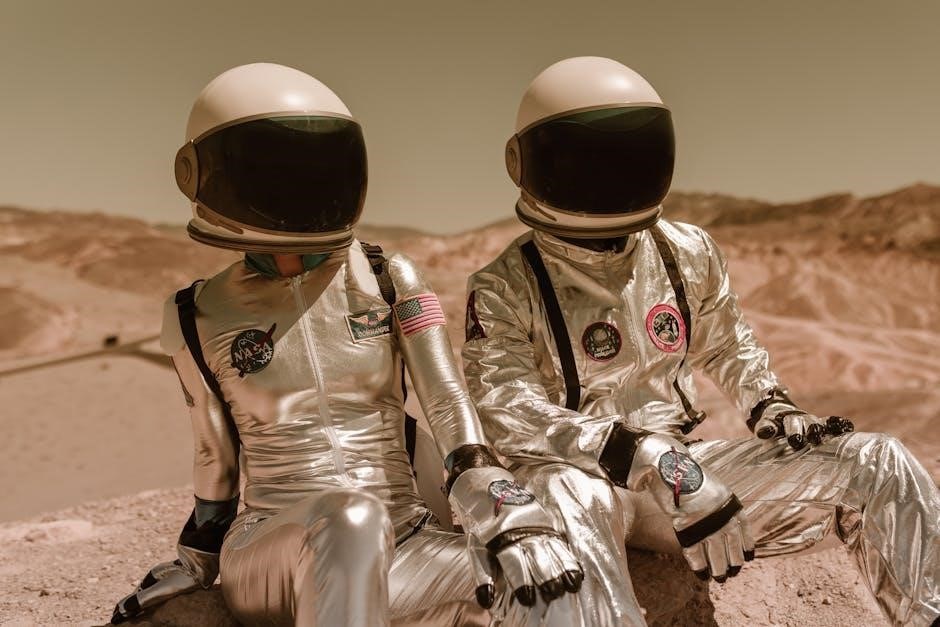Douglas Adams’ The Hitchhiker’s Guide to the Galaxy blends humor, satire, and sci-fi, creating a cosmic adventure that captivates readers with its absurdity and quirky characters, inspiring fans to seek similar tales.
Overview of “The Hitchhiker’s Guide to the Galaxy”
The Hitchhiker’s Guide to the Galaxy by Douglas Adams is a comedic science fiction series that originated as a radio broadcast in the 1970s. It follows the misadventures of Arthur Dent, an ordinary man who hitches a ride on a passing spaceship moments before Earth’s demolition. Joined by an alien friend, Ford Prefect, and other quirky characters, Arthur travels through the galaxy, encountering bizarre worlds, alien species, and absurd situations. The series is known for its satirical take on science fiction tropes, blending humor with philosophical themes like the meaninglessness of life and the universe. The guide itself, a fictional encyclopedia, serves as a narrative device, offering witty and often irrelevant advice. With its unique blend of absurdity, clever wit, and cosmic exploration, The Hitchhiker’s Guide to the Galaxy has become a cult classic, inspiring fans to explore similar books that share its offbeat charm and intellectual humor.
Why Fans Love the Book

Fans adore The Hitchhiker’s Guide to the Galaxy for its unique blend of humor, satire, and science fiction. The book’s absurdity and quirky characters, like Marvin the Paranoid Android, create a hilarious yet thought-provoking narrative. Its ability to tackle complex themes such as existentialism and the meaninglessness of life, all while maintaining a light-hearted tone, resonates deeply. The relatable protagonist, Arthur Dent, grounds the story, making the fantastical elements more accessible. Additionally, the book’s origins as a radio series have led to various adaptations, including TV shows and films, expanding its reach. The guide’s witty advice and the characters’ misadventures have made it a cult classic, inspiring fans to seek similar books that offer the same mix of humor, intellect, and cosmic adventure. Its timeless appeal continues to attract new readers, ensuring its place as a beloved favorite in the science fiction comedy genre.

Key Elements of “The Hitchhiker’s Guide to the Galaxy”
The book combines humor, satire, and absurdity with quirky characters, creating a cult classic that explores existential themes through non-linear, fantastical narratives, captivating fans worldwide with its unique charm.
Humor and Satire
The Hitchhiker’s Guide to the Galaxy masterfully blends humor and satire, using absurdity to critique societal norms, politics, and the human condition. Adams’ witty dialogue and ridiculous scenarios, like Vogon poetry or the Ravenous Bugblatter Beast, highlight the universe’s inherent absurdity. The book’s satirical edge pokes fun at bureaucracy, technology, and existentialism, making complex themes accessible through laughter. Its comedic approach to serious topics creates a unique balance, appealing to both casual readers and those seeking deeper meaning. The humor is character-driven, with figures like Marvin the Paranoid Android and Zaphod Beeblebrox embodying comedic extremes. This blend of satire and absurdity not only entertains but also challenges readers to reflect on the world’s quirks, making it a timeless classic in comedic science fiction. The book’s ability to laugh at life’s seriousness resonates universally, ensuring its enduring popularity.
Space Opera Elements
The Hitchhiker’s Guide to the Galaxy seamlessly incorporates space opera elements, immersing readers in an expansive, fantastical universe. The story traverses multiple planets, alien civilizations, and futuristic technologies, such as hyperdrive and the Heart of Gold spaceship. These elements create a sense of cosmic wonder and adventure. The destruction of Earth for a hyperspace bypass and the search for the ultimate question to life, the universe, and everything (42) exemplify the grand, interconnected narratives typical of space operas. Adams’ unique approach uses these sci-fi tropes to explore philosophical and satirical themes, blending action, exploration, and humor. The novel’s vivid world-building, from Magrathea’s planet constructors to the Vogon Constructor Fleet, enhances its epic scale. By combining these space opera elements with absurdity and wit, Adams crafts a story that feels both thrilling and thought-provoking, appealing to fans of science fiction and comedy alike. This cosmic backdrop is central to the book’s enduring charm.
Unique Characters and World-Building

The Hitchhiker’s Guide to the Galaxy captivates readers with its memorable characters and imaginative world-building. Arthur Dent, the ordinary Earthman, contrasts humorously with the eccentric alien cast, including Ford Prefect, an aloof but resourceful being, and Zaphod Beeblebrox, the charismatic yet reckless president of the galaxy. Marvin, the depressed android, adds a layer of dark humor and existential reflection. The narrative’s creativity extends to its settings, from the supercomputer Deep Thought to the legendary planet Magrathea, where worlds are constructed; Adams’ vivid descriptions of these worlds and civilizations, such as the Vogons and their bureaucratic monotony, enhance the story’s absurdity and depth. The blend of quirky characters and intricate, often absurd, world-building creates a universe that is both fantastical and relatable, making the book a standout in comedic science fiction. This unique combination has left a lasting impact on readers, inspiring a search for similarly imaginative tales.

Books with a Similar Comedic Fantasy Vibe
Discover novels like Good Omens, Guards! Guards!, and The Colour of Magic, which blend humor, fantasy, and adventure, offering witty dialogues and quirky worlds reminiscent of Adams’ style.
“Good Omens” by Terry Pratchett and Neil Gaiman
Good Omens is a hilarious and imaginative tale of an unlikely duo—an angel named Aziraphale and a demon named Crowley—trying to prevent the Apocalypse. With sharp wit, absurd characters, and a blend of fantasy and humor, this novel mirrors the satirical tone of The Hitchhiker’s Guide to the Galaxy. The story explores themes of good, evil, and free will, while its lighthearted take on the classic battle between Heaven and Hell keeps readers entertained. The characters’ quirky interactions and the absurdity of their mission create a series of comical and unpredictable situations. Fans of Adams’ work will appreciate the clever dialogue, satire, and the unique blend of humor and philosophy. This collaboration between Pratchett and Gaiman is a perfect match for those who enjoy cosmic adventures with a touch of absurdity and wit.
“Guards! Guards!” by Terry Pratchett
Guards! Guards! is a comedic fantasy novel set in the fictional city of Ankh-Morpork. The story follows the inept Night Watch, a group of city guards more focused on their personal vices than maintaining order. When a plot to bring back dragons to seize power unfolds, Sam Vimes, the leader of the Night Watch, finds himself thrust into unexpected responsibility. With the help of a misfit group, including a drunk dwarf and a talking swamp dragon, Vimes must confront the chaos and restore order. Pratchett’s trademark wit and satire shine as the novel humorously explores themes of power, corruption, and the potential for change. Its lighthearted yet poignant tone, combined with quirky characters and absurd situations, makes it a perfect match for fans of The Hitchhiker’s Guide to the Galaxy. The blend of humor and social commentary ensures a delightful and thought-provoking read.

“The Colour of Magic” by Terry Pratchett
The Colour of Magic is the first novel in Terry Pratchett’s Discworld series, introducing readers to a flat world balanced on the backs of four elephants. The story follows Rincewind, a hapless wizard, and Twoflower, the Disc’s first tourist, as they embark on a series of misadventures. Their journey is filled with quirky characters, including a sentient suitcase and a barbarian hero, creating a tapestry of humor and satire. Pratchett’s unique narrative style blends absurdity with clever wit, poking fun at fantasy tropes and societal norms. Much like The Hitchhiker’s Guide to the Galaxy, the novel offers a lighthearted yet insightful exploration of human nature, making it a compelling read for fans of comedic fantasy. The book’s whimsical charm and comedic twists ensure an entertaining and memorable experience, solidifying its place as a classic in the genre.

Satirical Science Fiction Recommendations
Discover books that blend humor with sharp societal critiques, offering a fresh take on science fiction. Explore absurd worlds, quirky characters, and witty commentary on human nature and technology.
“Red Dwarf” by Grant Naylor
“Red Dwarf” by Grant Naylor is a hilarious science fiction novel that follows the misadventures of Dave Lister, the last human survivor, and his companions on the massive spaceship Red Dwarf. After a night of drinking, Lister wakes up three million years in the future, where he finds himself the sole human survivor, accompanied by a hologram of his dead bunkmate, Arnold Rimmer, and a cat that has evolved into a humanoid creature. The novel combines absurdity and wit as Lister and Rimmer navigate the challenges of deep space, loneliness, and boredom. Their dysfunctional relationship provides much of the humor, with Rimmer’s uptight personality clashing hilariously with Lister’s laid-back, slobby nature. The book explores themes of human nature, artificial intelligence, and the meaning of existence, all while maintaining a lighthearted and comedic tone reminiscent of The Hitchhiker’s Guide to the Galaxy.
“The Restaurant at the End of the Universe” by Douglas Adams
“The Restaurant at the End of the Universe” by Douglas Adams is the second installment in The Hitchhiker’s Guide to the Galaxy series, continuing the cosmic adventures of Arthur Dent and his companions. The story takes readers on a wild journey through time and space, featuring the enigmatic Vogons, the super-intelligent mice, and the legendary restaurant at the end of the universe. Known for its absurd humor and satirical take on science fiction tropes, the book delves into themes of existence, humanity, and the meaninglessness of life. Adams’ signature wit and imaginative storytelling make this sequel just as captivating as its predecessor. Fans of the first book will love the deeper exploration of characters like Zaphod Beeblebrox and Marvin the Paranoid Android, ensuring a hilarious and thought-provoking ride through the cosmos.
“Year Zero” by Rob Reid
“Year Zero” by Rob Reid is a hilarious and imaginative sci-fi novel that explores the absurd consequences of copyright infringement on an intergalactic scale. The story follows Nick Carter, a human copyright lawyer, who discovers that Earth’s music has become the most popular in the universe. When alien civilizations realize they owe astronomical fees for enjoying Earth’s music without permission, it sparks a cosmic crisis. Reid’s witty and satirical take on intellectual property, combined with his quirky characters and absurd scenarios, makes this book a perfect match for fans of The Hitchhiker’s Guide to the Galaxy. The novel’s blend of humor, clever plot twists, and thought-provoking themes about culture and creativity ensures a wildly entertaining ride through the galaxy.

Absurd and Quirky Narrative Styles
These books captivate with unconventional storytelling, blending humor and surrealism. Quirky characters, non-linear plots, and offbeat adventures create a unique reading experience, perfect for fans of Hitchhiker’s Guide.
“The Sirens of Titan” by Kurt Vonnegut
Kurt Vonnegut’s The Sirens of Titan is a masterful blend of satire, philosophy, and absurdity, much like The Hitchhiker’s Guide to the Galaxy. The story follows Malachi Constant, a wealthy but aimless man who becomes entangled in a cosmic game orchestrated by a distant civilization. Through a series of bizarre events, including time travel and interplanetary journeys, Constant’s life intertwines with that of Winston Niles Rumfoord, a space traveler who manipulates events across the galaxy. Vonnegut’s signature dark humor and satirical tone explore themes of fate, free will, and the absurdity of human existence. The novel’s nonlinear narrative and quirky characters create a thought-provoking and whimsical experience, making it a perfect read for fans of Adams’ cosmic adventures. Its unique blend of philosophy and humor ensures a captivating journey through the absurdities of life and the universe.

“John Dies at the End” by David Wong
John Dies at the End by David Wong is a wildly unconventional blend of humor, horror, and science fiction that resonates with fans of The Hitchhiker’s Guide to the Galaxy. The story follows David Wong and his friend John as they encounter a mysterious drug called “Soy Sauce,” which grants them paranormal abilities and reveals a hidden supernatural world. The narrative is non-linear, jumping between timelines and perspectives, creating a disorienting yet engaging experience. Wong’s unique voice combines dark humor with absurdity, exploring themes of alternate dimensions, monstrous creatures, and existential threats. Like Douglas Adams, Wong uses wit and satire to navigate the bizarre, making the book a perfect fit for readers who enjoy quirky, offbeat storytelling. Its unpredictable nature and blend of humor with the surreal make it a standout choice for those seeking a similarly unconventional adventure.
“Catch-22” by Joseph Heller
Catch-22 by Joseph Heller is a satirical masterpiece that, like The Hitchhiker’s Guide to the Galaxy, uses absurdity and dark humor to explore the illogical nature of human systems. Set during World War II, the novel follows Captain John Yossarian, a U.S. Air Force bombardier, as he navigates the bureaucratic nightmare of a military regulation known as Catch-22. This paradoxical rule traps Yossarian in a cycle of madness, where seeking a mental evaluation to avoid dangerous missions proves his sanity, thus making him fit for duty. Heller’s sharp wit and critique of war’s bureaucracy resonate deeply, much like Adams’ critique of human folly. The novel’s non-linear narrative and eccentric characters add to its chaotic charm, making it a compelling read for fans of satirical and thought-provoking storytelling. Its exploration of power, logic, and the human condition aligns perfectly with the themes found in The Hitchhiker’s Guide to the Galaxy.

Philosophical and Thought-Provoking Themes
The Hitchhiker’s Guide to the Galaxy masterfully blends humor with deep existential questions, exploring absurdity, the meaning of life, and the universe’s vast mysteries, resonating with fans seeking both laughter and introspection.
“Slaughterhouse-Five” by Kurt Vonnegut
Slaughterhouse-Five is a powerful blend of science fiction, satire, and anti-war sentiment, following Billy Pilgrim, a World War II soldier who becomes “unstuck in time.” This unique narrative structure allows Billy to experience his life out of order, jumping between his traumatic wartime experiences, his mundane post-war life, and even his abduction by aliens. The novel is deeply philosophical, exploring themes of fate, free will, and the absurdity of human violence. Vonnegut’s dark humor and satirical tone underscore the senselessness of war and the emotional toll it takes on individuals. The book’s non-linear storytelling and existential reflections resonate with fans of The Hitchhiker’s Guide to the Galaxy, offering a thought-provoking and emotionally charged journey through time, memory, and the human condition.
“The Hitchhiker’s Guide to the Galaxy” Themes
The Hitchhiker’s Guide to the Galaxy masterfully blends humor with profound philosophical and existential themes. At its core, the book explores the absurdity of life, the universe, and everything in between, often using satire to critique human society and technology. The destruction of Earth for a hyperspace bypass and the search for the “Answer to the Ultimate Question of Life, the Universe, and Everything” (which turns out to be 42) highlight the futility of seeking simple solutions to complex existential questions. The novel also delves into the randomness of existence, the meaninglessness of human endeavors, and the inevitability of cosmic indifference. Through its quirky characters and intergalactic adventures, the book challenges readers to embrace the absurdity of life while finding humor in the face of uncertainty; These themes resonate deeply with fans, inspiring a quest for similar books that combine wit, philosophy, and cosmic exploration.
“Small Gods” by Terry Pratchett
Small Gods by Terry Pratchett is a thought-provoking novel that explores themes of religion, power, and belief within the Discworld universe. The story follows Brutha, a simple yet deeply devout novice in the Omnian Church, and the god Om, who has been reduced to a tortoise due to the dwindling faith of his followers. As Brutha and Om navigate a world of philosophical debates, political intrigue, and religious corruption, Pratchett uses his signature wit and satire to critique organized religion and the nature of divine power. The novel humorously examines how gods rely on human belief to exist, highlighting the absurdity of blind faith and the dangers of religious extremism. Fans of The Hitchhiker’s Guide to the Galaxy will appreciate the blend of humor, satire, and philosophical inquiry, making Small Gods a compelling read for those who enjoy questioning the big questions of existence.
If you enjoyed The Hitchhiker’s Guide to the Galaxy, these recommendations offer a perfect blend of humor, satire, and sci-fi, ensuring hours of laughter and thought-provoking adventures through space and beyond.
Final Thoughts on Similar Books
Books like The Hitchhiker’s Guide to the Galaxy offer a unique blend of humor, satire, and sci-fi that captivates readers. Fans of Douglas Adams’ work often seek stories with quirky characters, absurd situations, and thought-provoking themes; Titles like Good Omens, Guards! Guards!, and Red Dwarf deliver similar vibes, combining wit with cosmic adventures. These novels explore themes of human nature, technology, and existence, often through a comedic lens. For those who enjoyed the absurdity of The Hitchhiker’s Guide, these recommendations provide endless hours of entertainment and intellectual stimulation. Whether you’re laughing at the misadventures of angels and demons or exploring the vastness of space with eccentric characters, these books promise to keep the spirit of Adams’ legacy alive. Dive into these tales for a journey of humor, satire, and unforgettable storytelling.
Encouragement to Explore More
Exploring books similar to The Hitchhiker’s Guide to the Galaxy is a gateway to a universe of humor, satire, and imaginative storytelling. Readers who cherish Adams’ unique style will find joy in discovering new authors and series that echo his wit and creativity. From the comedic fantasy of Terry Pratchett to the absurd sci-fi of Kurt Vonnegut, there’s a wealth of literature waiting to be devoured. Each of these books offers a fresh perspective on life, the universe, and everything in between, promising hours of entertainment and thought-provoking reflections. Don’t hesitate to embark on this literary journey—every page turned is an opportunity to find your next favorite story. Let the legacy of The Hitchhiker’s Guide inspire you to explore, laugh, and ponder the vastness of existence through the magic of words.